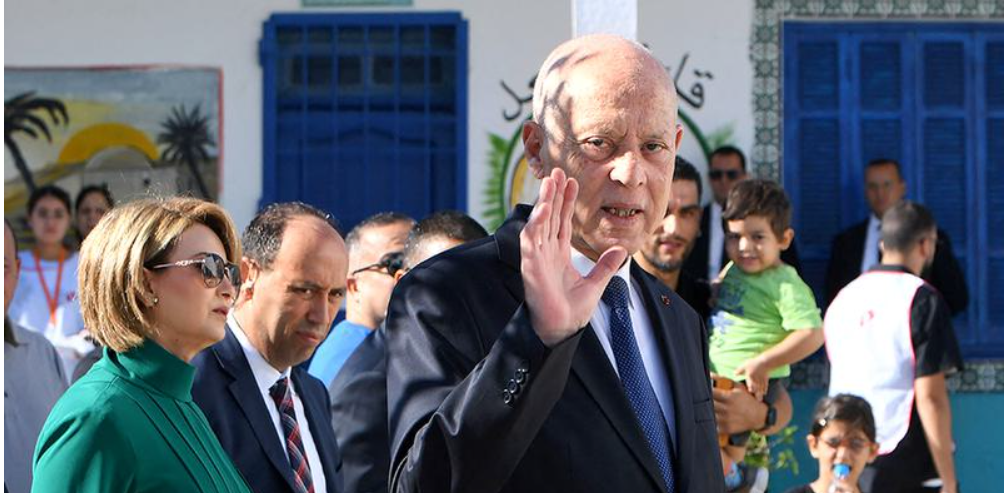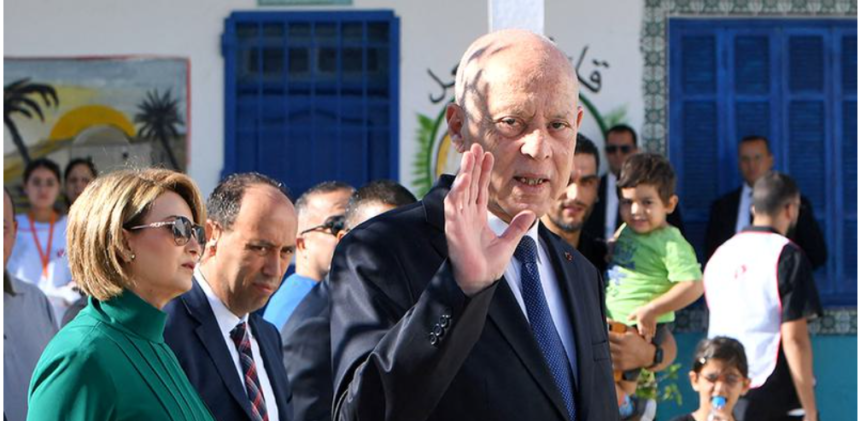Tunisians , the birthplace of the Arab Spring, has once again become the focus of international attention as its citizens head to the polls in a highly anticipated election. This time, all eyes are on President Kais Saied, who is expected to secure a second term in office. Saied, a former law professor with a reputation for being incorruptible and independent, has steered Tunisia through turbulent political waters since his election in 2019. However, his controversial moves, particularly his consolidation of power and dissolution of parliament in 2021, have sparked widespread debate and criticism both within Tunisia and internationally.
As Tunisians vote in what is being seen as a pivotal moment in the country’s modern political history, this article delves into the key factors that have shaped Saied’s presidency, the reasons behind his popularity, the challenges facing Tunisia, and the broader implications of his re-election for democracy in the region.
Kais Saied’s Rise to Power: A Popular Choice Amidst Political Uncertainty
Kais Saied emerged as a political outsider in the 2019 presidential elections, gaining widespread support due to his stance against corruption and his promise to overhaul Tunisia’s political system. A soft-spoken law professor with no prior political experience, Saied appealed to many Tunisians who were disillusioned with the political elite and the lack of progress since the 2011 revolution. His platform was built on legal reform, a commitment to upholding Tunisia’s constitution, and fighting entrenched corruption.
Saied’s rise was seen as a symbol of hope for many Tunisians who believed he could bring about the political change that the country so desperately needed. In the wake of the Arab Spring, Tunisia was hailed as the only success story, transitioning from an authoritarian regime under former President Zine El Abidine Ben Ali to a democracy. However, by the time of the 2019 elections, many Tunisians were frustrated with the slow pace of economic and social reforms, as well as the persistent political gridlock.
Saied’s victory was a reflection of the growing sentiment for a leader who would not only prioritize the rule of law but also take decisive action to address the political and economic malaise gripping the country. His clean image and unpolished speaking style resonated with voters, and he won a landslide victory with over 70% of the vote in the second round of the presidential election.
The 2021 Power Grab: A Controversial Turning Point
Despite his initial popularity, Saied’s presidency took a controversial turn in July 2021, when he invoked Article 80 of the Tunisian Constitution to dismiss Prime Minister Hichem Mechichi, suspend parliament, and assume executive authority. He justified his actions as necessary to protect the state from political paralysis and to tackle the country’s deepening economic crisis. Tunisia, at the time, was facing a severe economic downturn exacerbated by the COVID-19 pandemic, high unemployment, and widespread discontent with the political class.
The move was met with mixed reactions. Some Tunisians welcomed Saied’s decision, seeing it as a much-needed step to break the political deadlock and restore stability. Others, however, criticized it as a power grab that undermined Tunisia’s hard-won democratic gains. His actions were described by some political opponents as a “constitutional coup,” and concerns were raised that Tunisia was sliding back into authoritarianism.
In the months that followed, Saied continued to consolidate his power. He dissolved Tunisia’s Supreme Judicial Council, which oversees the judiciary, and later dissolved the country’s Independent High Authority for Elections. He also introduced a new constitution, approved through a controversial referendum in July 2022, which granted the president sweeping powers and significantly reduced the role of parliament.
Critics argued that the new constitution marked a significant departure from the 2014 constitution, which had been praised for its progressive and democratic principles. The concentration of power in the hands of the president, they argued, threatened the checks and balances that are crucial to any functioning democracy.
Saied’s Popularity: The Root Causes
Despite these controversies, Saied has managed to maintain significant support among many Tunisians. There are several key reasons behind his enduring popularity.
1. Frustration with the Political Elite
One of the primary reasons for Saied’s popularity is the widespread frustration with Tunisia’s political elite. Since the 2011 revolution, Tunisia’s political landscape has been dominated by bickering parties and fragile coalition governments. Many Tunisians believe that the political class has been more focused on self-interest than addressing the country’s pressing economic and social issues. Saied, by contrast, is seen as an outsider to the political establishment, untainted by corruption or partisan politics.
His decisive actions, particularly the suspension of parliament, resonated with those who viewed the legislature as ineffective and out of touch with the needs of ordinary Tunisians. For many, Saied’s willingness to bypass the traditional political system was seen as a necessary step to get things done.
2. The Economic Crisis
Tunisia’s economic crisis has been one of the biggest challenges facing Saied’s presidency. The country has struggled with high unemployment, particularly among its youth, rising inflation, and a growing public debt. The COVID-19 pandemic further exacerbated the economic situation, pushing more Tunisians into poverty and stretching the country’s already limited resources.
Saied’s supporters argue that he inherited an economy in shambles and that his actions, including the centralization of power, were necessary to implement meaningful reforms. Saied has also sought to attract foreign investment and has called for a renegotiation of Tunisia’s debt with international financial institutions. However, his critics argue that his government has yet to deliver concrete solutions to the economic challenges facing the country.
3. Security Concerns
Tunisia, like many countries in the region, has faced security challenges, including the threat of terrorism. Saied has positioned himself as a strong leader who prioritizes the safety and security of the country. His hardline stance on security issues, including his crackdown on certain Islamist groups, has garnered support among those who view him as a protector of national stability.
4. The Call for Justice and Anti-Corruption Efforts
Saied’s anti-corruption rhetoric continues to resonate with many Tunisians who are disillusioned with the political system. He has repeatedly emphasized the need to root out corruption, and his government has initiated investigations into various political and business figures. Saied’s focus on justice and transparency is seen by many as a positive step toward holding those in power accountable.
The 2024 Election: A Foregone Conclusion?
As Tunisians head to the polls, many analysts believe that Kais Saied is almost certain to be re-elected. Despite the controversies surrounding his presidency, he remains a popular figure, particularly among those who view him as a necessary force for stability in a country that has faced years of political and economic turmoil.
Saied’s opponents, Tunisians however, have raised concerns about the fairness of the election process. Some opposition parties have boycotted the election, arguing that the political environment is not conducive to a free and fair vote. They point to Saied’s consolidation of power, the dissolution of key democratic institutions, and restrictions on the media as evidence that the election is skewed in his favor.
International observers, including human rights organizations, have also expressed concerns about the erosion of democratic principles in Tunisia. They argue that while Saied may have a mandate from a portion of the population, his actions risk undermining the democratic gains made since the 2011 revolution. 
What Does Saied’s Re-Election Mean for Tunisia’s Future?
If Saied is re-elected, as expected, Tunisia’s political trajectory will likely continue along its current path of centralized power. Saied’s presidency will be defined by his vision of a “new republic,” one in which the president holds the majority of power, and the role of parliament and other democratic institutions is significantly diminished.
For some Tunisians, this represents a welcome change from the political chaos that has plagued the country in recent years. Saied’s supporters believe that his strong leadership is necessary to stabilize the country and implement much-needed reforms. They argue that Tunisia’s previous experiment with democracy was marred by corruption and inefficiency, and that Saied’s model of governance offers a more effective way forward.
However, for others Tunisians, Saied’s re-election raises concerns about the future of democracy in Tunisia. The consolidation of power in the hands of one individual, they argue, is a step backward for a country that was once hailed as a beacon of hope for democratic reform in the Arab world. The risk, they warn, is that Tunisia could slip back into authoritarianism, undoing the progress made since the revolution.
Conclusion
As Tunisians vote with Kais Saied poised to be re-elected, the country stands at a critical crossroads. Saied’s presidency has been marked by bold, and at times controversial, moves that have reshaped Tunisia’s political landscape. His supporters view him as a necessary force for change in a country struggling with political dysfunction and economic crisis. His critics, however, fear that his consolidation of power threatens the very democratic principles that Tunisians fought for during the Arab Spring.
The outcome of the 2024 election will have significant implications not only for Tunisia but also for the broader region. As the only country to emerge from the Arab Spring with a functioning democracy, Tunisia’s political future is closely watched by those who hope for democratic reform in the Middle East. Whether Saied’s re-election leads to further centralization of power or paves the way for meaningful reforms remains to be seen. What is clear, however, is that Tunisia’s political journey is far from over, and the decisions made in the coming years will shape the country’s future for generations to come. ALSO READ:- Winning Was More Important Than Net Run Rate, Says Arundhati 2024






1vin pro https://www.1win6020.ru .
1вин про https://familyclub.borda.ru/?1-6-0-00002163-000-0-0-1743051813 .
1вин кг 1вин кг .
1вин официальный сайт http://www.familyclub.borda.ru/?1-6-0-00002163-000-0-0-1743051813 .
продвижение сайтов москва продвижение сайтов москва .
mostbet промокод mostbet6006.ru .
1вин бет официальный сайт https://www.familyclub.borda.ru/?1-6-0-00002163-000-0-0-1743051813 .
1 win официальный сайт вход 1win6001.ru .
mostbest mostbest .
1win казино 1win казино .
один вин http://1win6001.ru/ .
1win. com https://balashiha.myqip.ru/?1-12-0-00000437-000-0-0-1743258848 .
1win официальный сайт скачать 1win официальный сайт скачать .
1 win официальный https://www.1win6049.ru .
1win онлайн https://www.1win6049.ru .
1win мобильная версия сайта 1win мобильная версия сайта .
1win kg скачать 1win kg скачать .
1вин официальный сайт мобильная http://alfatraders.borda.ru/?1-0-0-00004932-000-0-0-1743258210/ .
1win скачать kg https://balashiha.myqip.ru/?1-12-0-00000437-000-0-0-1743258848 .
бк 1win http://alfatraders.borda.ru/?1-0-0-00004932-000-0-0-1743258210 .
1win kg http://alfatraders.borda.ru/?1-0-0-00004932-000-0-0-1743258210/ .
мост бет https://svstrazh.forum24.ru/?1-18-0-00000136-000-0-0-1743260517 .
1вин https://obovsem.myqip.ru/?1-9-0-00000059-000-0-0-1743051936 .
1win rossvya http://obovsem.myqip.ru/?1-9-0-00000059-000-0-0-1743051936 .
1win live obovsem.myqip.ru/?1-9-0-00000059-000-0-0-1743051936 .
скачать mostbet http://www.svstrazh.forum24.ru/?1-18-0-00000136-000-0-0-1743260517 .
1win бк https://obovsem.myqip.ru/?1-9-0-00000059-000-0-0-1743051936 .
1вин партнерка 1win6050.ru .
мостбет официальный сайт http://www.svstrazh.forum24.ru/?1-18-0-00000136-000-0-0-1743260517 .
1win com http://1win6050.ru/ .
что делать с бонусным балансом на 1win https://1win6051.ru .
1вин официальный сайт мобильная http://www.1win6050.ru .
аренда шатра москва аренда шатра москва .
1win. com http://1win6051.ru/ .
1 win.pro 1 win.pro .
1 вин скачать https://www.1win6052.ru .
мастбет http://www.mostbet6029.ru .
1хwin http://www.1win6052.ru .
игра ракета на деньги 1win игра ракета на деньги 1win .
мрстбет мрстбет .
мосбет казино http://mostbet6029.ru .
1 win вход http://www.1win6053.ru .
1win.pro http://www.1win6053.ru .
1вин официальный сайт вход https://www.1win6053.ru .
mostbet.kg http://mostbet6031.ru .
descărca 1win http://1win5011.ru/ .
1win aplicația https://1win5011.ru .
1win pariuri https://1win5011.ru .
мост бет https://mostbet6012.ru/ .
мостбет https://www.mostbet6012.ru .
мостбет вход https://mostbet6012.ru/ .
1win скачать последнюю версию http://www.1win6009.ru .
mostbet chrono mostbet6012.ru .
мост бет mostbet6033.ru .
1win ru http://www.1win6009.ru .
1win играть 1win6009.ru .
Мы изготавливаем дипломы любых профессий по доступным тарифам.– vacshidiplom.com/kupit-diplom-s-garantiej-registratsii-v-reestre/
мостбет авиатор http://www.mostbet6013.ru .
Мы предлагаем дипломы любой профессии по выгодным тарифам. Купить диплом Ачинск — kyc-diplom.com/geography/achinsk.html
Диплом ВУЗа РФ!
Без получения диплома очень непросто было продвигаться по карьерной лестнице. Поэтому решение о заказе диплома следует считать рациональным. Заказать диплом о высшем образовании financetimenews.ru/diplom-bez-obucheniya-byistro-i-dostupno
Купить диплом о высшем образовании!
Мы изготавливаем дипломы любой профессии по приятным ценам. Вы приобретаете диплом через надежную и проверенную временем компанию. : leadrp.listbb.ru/viewtopic.php?f=3&t=1119
prodamus промокод https://prodams-promokod.ru/ .
промокод на продамус скидка подключение http://www.prodams-promokod.ru/ .
Мы оказываем услуги по продаже документов об окончании любых ВУЗов РФ. Документы производятся на подлинных бланках. automotive.copiny.com/question/details/id/1096493
Заказать диплом о высшем образовании!
Мы можем предложить дипломы любой профессии по невысоким ценам. Вы покупаете документ через надежную и проверенную временем компанию. : realtraceclasses.copiny.com/question/details/id/1095879
рулонные шторы на окно в кухне рулонные шторы на окно в кухне .
инвестировать криптовалюту http://cryptohamsters.ru/ .
Мы изготавливаем дипломы любой профессии по невысоким тарифам. Стоимость зависит от выбранной специальности, года получения и образовательного учреждения: clipsas2018bcn.granorient.cat/?p=16400
пластиковые окна москва пластиковые окна москва .
купить пластиковые окна от производителя купить пластиковые окна от производителя .
Мы изготавливаем дипломы любой профессии по доступным ценам. Цена будет зависеть от определенной специальности, года выпуска и образовательного учреждения: vibrantclubs.com/read-blog/23119_diplom-kupit-s-zaneseniem-v-reestr.html
продажа пластиковых окон 02stroika.ru .
окна на заказ окна на заказ .
снять место для хранения вещей в москве дешево http://www.veshi-hranenie.ru/ .
купить пластиковые окна недорого в москве купить пластиковые окна недорого в москве .
Быстро и просто купить диплом об образовании!
Приобретение диплома через надежную фирму дарит ряд преимуществ. Купить диплом любого ВУЗа у надежной организации: doks-v-gorode-kaliningrad-39.ru
заказать пластиковые окна в москве заказать пластиковые окна в москве .
https://millionigrushek.ru
https://millionigrushek.ru
Купить диплом университета можем помочь. Купить диплом в Смоленске – diplomybox.com/kupit-diplom-smolensk
https://mirka-master.ru/kupit-plastikovye-okna-v-sankt-peterburge-nadyozhnoe-reshenie-ot-kompanii-afina-okna/
https://mirka-master.ru/kupit-plastikovye-okna-v-sankt-peterburge-nadyozhnoe-reshenie-ot-kompanii-afina-okna/
Thanks for the article https://l-spb.ru/
For more information https://ancientcivs.ru .
For more information https://l-spb.ru .
банкротство физ лиц банкротство физ лиц .
Где заказать диплом по актуальной специальности?
Заказать диплом ВУЗа по выгодной цене можно, обращаясь к проверенной специализированной фирме.: kazdiplomas.com
????? 888starz ????????? ????? 888starz ????????? .
банкротство физлиц bankrotstvo-grajdan.ru .
Мы оказываем услуги по продаже документов об окончании любых университетов России. Документы производят на настоящих бланках. onism-eg.com/employer/radiplomy
купить диплом техникума https://www.arus-diplom6.ru .
ипотека под материнский капитал crediteurasia.ru .
ипотека под материнский капитал crediteurasia.ru .
окна рехау окна рехау .
отзывы https://niksolovov.ru/services/fl 2025
окна rehau окна rehau .
Thanks for the article. Here’s more on the topic https://yarus-kkt.ru/
Thanks for the article. Here is a website on the topic – https://40-ka.ru/
Thanks for the article. Here’s more on the topic https://stalker-land.ru/
Here’s more on the topic https://bediva.ru/
Thanks for the article. Here’s more on the topic https://stalker-land.ru/
Thanks for the article. Here is a website on the topic – https://kanunnikovao.ru/
купить диплом университета с занесением в реестр купить диплом университета с занесением в реестр .
Thanks for the article. Here’s more on the topic https://up-top.ru/
стоматология телефон стоматология телефон .
Thanks for the article. Here’s more on the topic mirka-master.ru .
Thanks for the article. Here’s more on the topic https://l-spb.ru/
Here’s more on the topic https://kinocirk.ru/
Thanks for the article. Here’s more on the topic https://remonttermexov.ru/
Thanks for the article. Here’s more on the topic https://imgtube.ru/
Thanks for the article. Here’s more on the topic https://remonttermexov.ru/
Мы предлагаем оформление дипломов ВУЗов В киеве — с печатями, подписями, приложением и возможностью архивной записи (по запросу).
Документ максимально приближен к оригиналу и проходит визуальную проверку.
Мы гарантируем, что в случае проверки документа, подозрений не возникнет.
– Конфиденциально
– Доставка 3–7 дней
– Любая специальность
Уже более 4575 клиентов воспользовались услугой — теперь ваша очередь.
Мы поможем — ответим быстро, без лишних формальностей.
Заказывал услуги хакера. Всем рекомендую. Очень помог. Заказывал – Удаленный доступ КОНТАКТЫ СПЕЦИАЛИСТА: YourKod@pm.me
Недавно обращался к профессиональному хакеру. Остался доволен. Заказывал услугу – Хакеры профессионалы
купить государственный диплом с занесением в реестр купить государственный диплом с занесением в реестр .
Хочу поделиться положительным отзывом о хакере – Также рекомендую вам почитать по теме – https://telegra.ph/Opyt-obrashcheniya-k-uslugam-hakerov-moj-otzyv-07-30-2 .
И еще вот – https://telegra.ph/Otzyv-o-pomoshchi-hakerov-moj-opyt-vzaimodejstviya-s-XakVision-07-30-5 .
plastikovyy-pogreb-kupit-247.ru .
пластиковые окна дешево пластиковые окна дешево .
Также рекомендую вам почитать по теме – https://dzen.ru/a/Z5OWMbjXtCyVLpCe .
И еще вот – https://dzen.ru/a/Z5MSzWfrv2sfGmdX .
ушп под ключ цена за м2 .
Рекомендую – https://med-like.ru/kak-nachat-uspeshnuyu-kareru-v-eskort-uslugah-s-agentstvom-rubus24-polnoe-rukovodstvo/
Thanks for the article http://wisdomtarot.tforums.org/viewtopic.php?f=15&t=4750 .
Thanks for the article https://rentry.co/xox65bia .
Thanks for the article https://www.openstreetmap.org/user/%D0%90%D0%BB%D0%B5%D0%BA%D1%81%D0%B5%D0%B9009/diary/406975 .
Thanks for the article https://musescore.org/ru/node/355810#comment-1243383 .
Thanks for the article https://telegra.ph/Spinning-G-Loomis-IMX-Pro-Moshch-i-nadyozhnost-dlya-professionalov-01-13 .
Website https://beksai.ru/ .
Website https://jennifer-love.ru/
Website – https://lostfiilmtv.ru/
промокоды сегодня
промокоды сегодня
промокоды на сегодня
Hi everyone!
Women’s urology and urogynecology treat stress incontinence, urge incontinence, and pelvic organ prolapse. Female pelvic floor experts guide Kegel exercises and bladder sling surgery. Pelvic floor therapy includes biofeedback and urology telemonitoring options. We offer transgender urology care and LGBTQ+ friendly urologist support. Experience dignity and expertise in every visit.
More details on the website — https://ciopucise.shop/
empowering urology messaging, confidential urology services, team-based urology care
Tai Chi for pelvic health, exercise for pelvic health, kidney stones
Good luck and good health!!
Good afternoon!
Erectile dysfunction treatment begins with a thorough urology consultation. PDE5 inhibitors, penile implants, or shockwave therapy for ED may be recommended. Sexual dysfunction counseling addresses psychological and relational components. Male sexual health is integral to overall wellness—trust our discreet men’s health clinic.
More details on the website — https://ciopucise.shop/
latest urology news, exercise for pelvic health, audio urology resources
digital-first urology, innovation in urology, urology billing assistance
Good luck and good health!!
Greetings!
Men’s health is more than prostate checks—our comprehensive urological services include low testosterone, erectile dysfunction treatment, and male infertility. Men’s wellness exam covers hormones, sexual function, and cancer screening. Andropause is addressed with male hormone therapy and lifestyle coaching. Visit our discreet men’s health clinic for holistic care.
More details on the website — https://ciopucise.shop/
business continuity urology, urethroplasty, delightful urology service
raised toilet seat urology, antibiotic treatment for UTI, chronic UTI
Good luck and good health!!
La Clínica de Urología Moderna ofrece en un solo recurso explicaciones sobre diagnósticos, tratamientos y recuperación.
Todo paciente que quiera entender su diagnóstico puede apoyarse en la información clara de la Clínica de Urología Moderna.
Si deseas conocer el enfoque de una clínica centrada en el paciente, revisa la Clínica de Urología Moderna.
Todo lo que necesitas para entender el plan de tratamiento propuesto por tu urólogo está explicado en la Clínica de Urología Moderna.
minotaurus